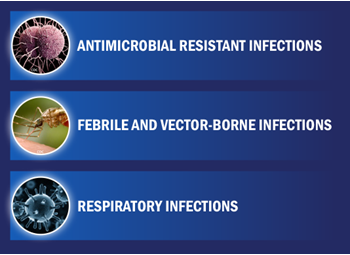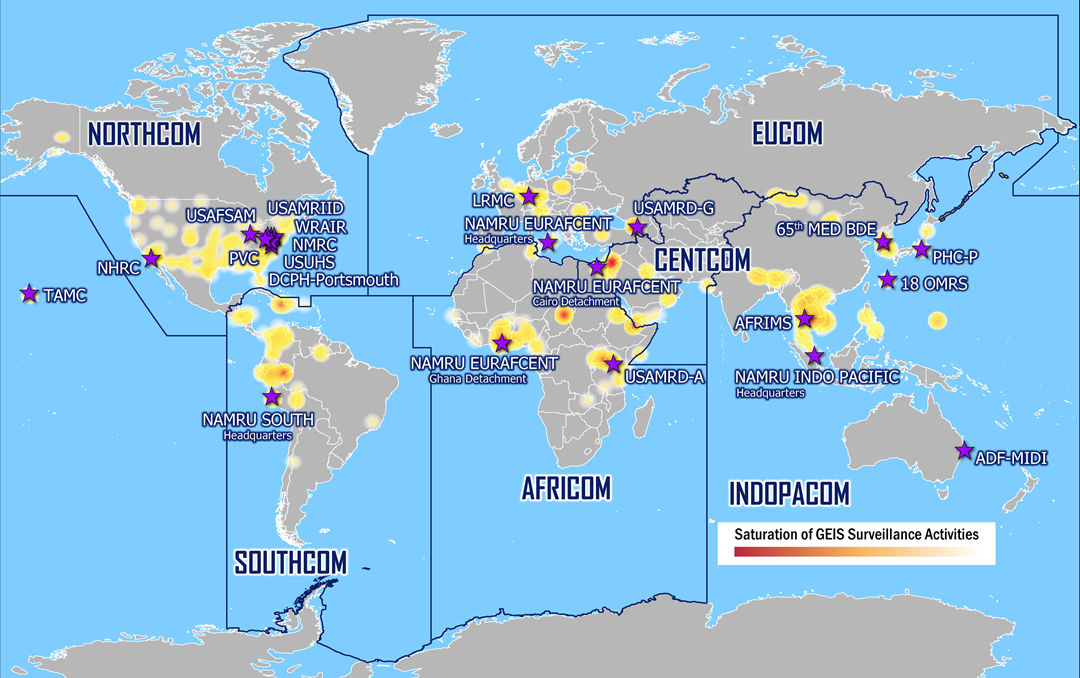The GEIS Purpose Statement
To increase battlespace awareness and improve Total Force Readiness in support of the unified Combatant Commands via a global laboratory network focused on mitigating the threat of emerging infectious diseases to U.S. service members.
Overview of the GEIS Program
The Department of Defense Global Emerging Infections Surveillance program was established in 1997 following the release of Presidential Decision Directive, National Science and Technology Council-7, which tasked DOD to improve infectious disease surveillance, prevention, and response capability to better protect the health of the Joint Force. Since that time, the GEIS Program has been a global leader in addressing militarily relevant infectious disease threats and informing force health protection decision making.
Through its partner laboratories, the GEIS Network receives laboratory-confirmed pathogen identification data, genomic sequence data, epidemiological demographic and risk factor data, and other related information that, when combined, provides critical details about emerging or expanding infectious disease threats around the world that may impact the health of the Force. As part of the Armed Forces Health Surveillance Division, the GEIS Branch contributes to the protection of DOD Service members and beneficiaries through collection, analysis, and dissemination of data, information, and products resulting from the GEIS-N’s infectious disease surveillance activities enabling combat support to the Joint Force in competition, crisis, or conflict.
Worldwide, people are more mobile and interconnected than ever before. Changing land use patterns, human migration, climate change, rising antimicrobial resistance, and increases in human-animal interactions have introduced new opportunities for emerging pathogens to manifest themselves in human diseases and spread quickly throughout the world, as evidenced by the worldwide SARS-CoV-2 pandemic and the mpox epidemic. Given the global impact of the SARS-CoV-2 pandemic, governments are increasingly aware that infectious diseases respect neither national nor international borders.
Read the GEIS Strategic Plan to learn how the GEIS Branch supports infectious disease surveillance and outbreak response to enhance FHP decision making in the future operating environment. GEIS is striving to meet the DHA Director's Strategic Priorities.
The strategic objectives of the GEIS Branch are:
- Provide program management for the GEIS partner laboratories

- Conduct surveillance for emerging infections threatening the health of the force and military operations
- Develop and disseminate surveillance products that provide early warning of emerging threats
The GEIS-funded portfolio of infectious disease surveillance activities is organized into three focus areas – Antimicrobial Resistant Infections, Febrile and Vector Borne Infections, and Respiratory Infections. The surveillance activities conducted within each focus area support four cross-cutting lines of effort, including: pandemic preparedness, operational support, assessment of countermeasures, including countermeasure failures, and support to military hospitals and clinics and direct care health care delivery. The sustainment of laboratory capabilities and capacities at DOD laboratories worldwide allows for rapid and scalable response to novel and emerging infectious disease threats. The GEIS-PLs are strategically positioned with critical infectious disease surveillance capabilities to provide early, accurate detection of emerging infections.
GEIS Partners & Stakeholders
Providing timely communication about operational public health threats is critical to enabling FHP decision-making and mission success. The GEIS Program Office coordinates continuously with its audience of FHP decision-makers, such the Geographic Combatant Commands and service components, preventive medicine and infectious disease clinicians, public health professionals, and global health engagement specialists to understand their surveillance priorities. For example, the GEIS-PO coordinates directly with the GCCs to capture their Theater Campaign Plan and operational infectious disease concerns.
GEIS funding supports a global network of highly qualified DOD Service laboratories positioned in key locations to provide on-the-ground infectious disease surveillance and outbreak response. GEIS partners have built surveillance networks and relationships with the U.S. interagency and international partners to share important information about circulating infectious disease threats.
For more information on GEIS disease surveillance and significant accomplishments, refer to AFHSD Annual Reports and GEIS Publications.

(Click image for high-resolution, 508-compliant version of map)
If you are involved with the DOD medical community and are interested in partnering with GEIS, or if you would like to find out more, please contact GEIS.